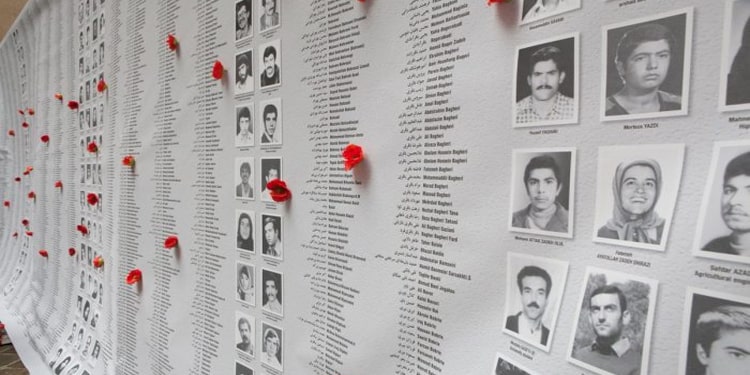Seven human rights experts from the United Nations have written to the Iranian government over the 1988 massacre of 30,000 political prisoners, which it calls a “crime against humanity,” and called for Iran to investigate or for the international community to launch an independent investigation.
Seven human rights experts from the United Nations have written to the Iranian government over the 1988 massacre of 30,000 political prisoners, which it calls a “crime against humanity,” and called for Iran to investigate or for the international community to launch an independent investigation.
UN experts’ letter dated September 3, which was only just made public, read: “Between July and September 1988, the Iranian authorities forcibly disappeared and extrajudicially executed thousands of imprisoned political dissidents affiliated with political opposition groups in 32 cities in secret and discarded their bodies, mostly in unmarked mass graves.”
“While it is believed that all of the individuals who disappeared during this period have been killed, individual information has not been provided to families about the fate and whereabouts of their relatives, the circumstances leading to their execution, and the location of their remains. This continues to cause extreme anguish to the families of the victims,” UN experts wrote.
“While it is believed that all of the individuals who disappeared during this period have been killed, individual information has not been provided to families about the fate and whereabouts of their relatives, the circumstances leading to their execution, and the location of their remains. This continues to cause extreme anguish to the families of the victims,” experts wrote.
It explains that the Iranian authorities excluded most of the victims’ names for burial registers to hide their burial location and prevent memorial services. They’ve also threatened, arrested, or beaten relatives who turn up at the Khavaran mass-grave site.
The letter added that the perpetrators enjoyed “systemic impunity” and that no Iranian official was ever brought to justice. Many actually still hold high ranking positions in Iran today, particularly in the Justice department like Judiciary Chief Ebrahim Raisi and Justice Minister Alireza Avaei, and are glorified by the state-run media for their role in the massacre.
“The mass, secret extrajudicial killings in 1988 amounted to crimes against humanity of murder, extermination, persecution, torture and other inhumane acts, and the systematic concealment of the fate and whereabouts of the victims amounts to an ongoing crime against humanity of enforced disappearance,” the letter read.
They called for Iran to investigate the massacre, disclose detailed information on the victims’ fates, and prosecute the perpetrators. If this did not happen, they called on the international community to set up an international investigation.
The signatories are:
- Javaid Rehman, Special Rapporteur on the situation of human rights in Iran
- Luciano Hazan, Chair-Rapporteur of the Working Group on Enforced or Involuntary Disappearances
- Agnes Callamard, Special Rapporteur on extrajudicial, summary or arbitrary executions
- Clement Nyaletsossi Voule, Special Rapporteur on the rights to freedom of peaceful assembly and of association
- Fionnuala Ní Aoláin, Special Rapporteur on the promotion and protection of human rights and fundamental freedoms while countering terrorism
- Nils Melzer, Special Rapporteur on torture and other cruel, inhuman or degrading treatment or punishment
- Fabian Salvioli, Special Rapporteur on the promotion of truth, justice, reparation and guarantees of non-recurrence
Maryam Rajavi, President-elect of the National Council of Resistance of Iran (NCRI), said: “It is time to stop granting immunity to Khamenei and other regime leaders and officials. They must face justice.”
She has previously called for the establishment of an international fact-finding mission to “seek justice for the victims of the 1988 massacre, and hold the perpetrators of this grave crime against humanity accountable.”
